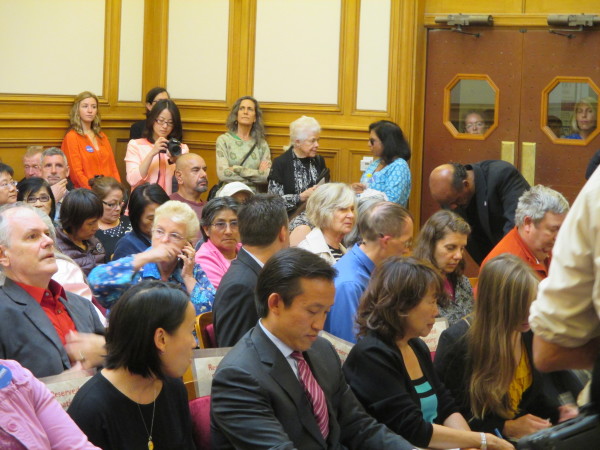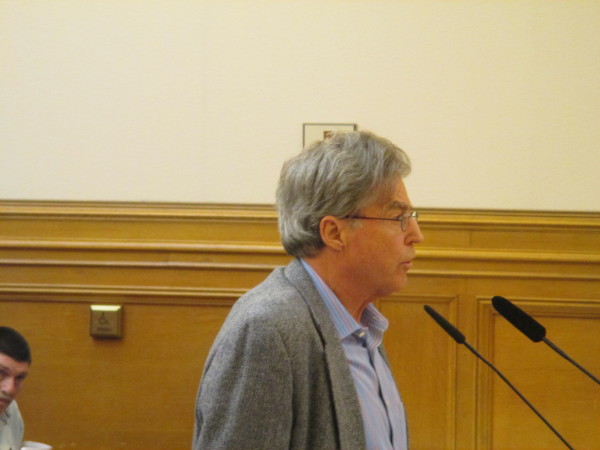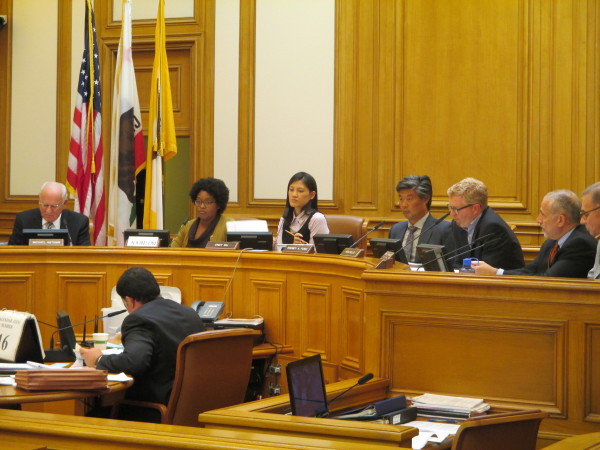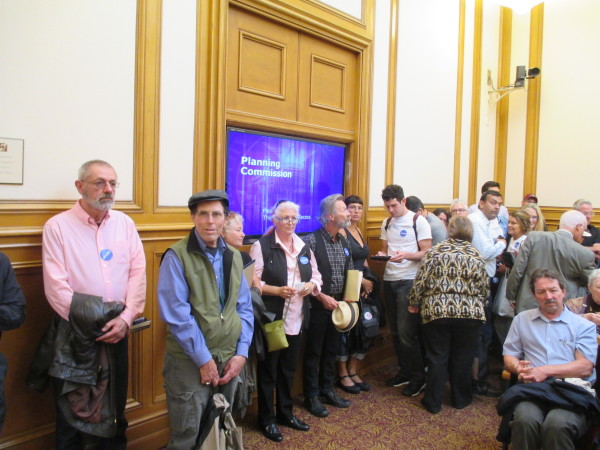
By Tim Redmond
So much happened at the Planning Commission hearing on Airbnb that I hardly know where to start, except:
The testimony that the commissioners heard is vastly different from what’s really happening in the city.
Speaker after speaker came to praise “home-sharing” – and virtually every one of them told the same basic story. They own homes and rent out spare rooms to help make ends meet. Some are single parents; some are retired and have empty-nest space. Some just love the idea of having visitors from other lands coming to stay with them.
All of them are renting rooms that, they say, would never otherwise be on the housing market.
And if that’s all that was going on, there really wouldn’t be much of an issue here.
There also wouldn’t be a $10 billion valuation for Airbnb.
None of the speakers who favor Sup. David Chiu’s legislation copped to owning multiple units that are rented out entirely as hotel rooms, depleting the city’s affordable housing stock.
I don’t know how much of this was orchestrated by Airbnb, but I know that none of the speakers talked of using VRBO or any other system. They were all Airbnb folks. And they all presented exactly the picture that the big company is looking to put forward.
In fact, one speaker noted that “home-sharing has been happening for a long time.” Which is absolutely true.
The difference is that, at least according to a Chronicle study (that Airbnb has never challenged) a full two-thirds of all units rented through the service are entire houses or apartments – “contradicting [Airbnb’s] portrayal as a service for people who rent out a spare room and interact with guests.”
That’s something that is new, driven by the crazy real-estate market and the desire of Airbnb to encourage as much use as possible. “It’s all about the pre-IPO valuation,” one local business leader told me outside the hearing.
The hearing was almost a farce on one level – the term “sharing” was bandied around so much that you could almost believe, if this wasn’t a huge, lucrative, real-estate operation, that you were at a latter-day hippie convention where the talk was all about peace, love, and international harmony.
So let’s get it straight right now: Airbnb hosts are not “sharing” their homes. They are renting them for money. That may be a good thing or a bad thing, but if we want to be honest, we should tell the truth.
I remember when I was first starting in the newspaper world, at the Hartford Courant, and the state was debating allowing limited gambling at a few places. The proponents insisted that the plans be described as “gaming,” which sounds a lot more fun and harmless than “gambling.” My editor told us never to let them get away with using a carefully crafted public-relations term: Gambling is gambling.
I got nothing against it. But when you win and lose money, maybe a whole lot of money, it’s more than a “game.”
And, as longtime housing advocate Brad Paul noted in testimony, “if this was just people renting out their rooms, it’s not a big deal. But if it’s thousands of units being turned into hotels, we are losing those thousands of units and we can’t afford that.”

As I’ve said before: If this was just people who wanted to rent out extra rooms, it would never have reached this point. But Airbnb and VRBO are trying to turn this into very, very big money, which means big growth – and much of that money and growth comes from people buying buildings and renting them out entirely to tourists.
Doug Engmann, who was one of the sponsors of a ballot measure that would strictly limit short-term rentals, told the commission that the Chiu legislation would “rezone the entire city so that every permanent resident can rent out space as a hotel room.” The law would redefine residential use to include commercial use – a huge deal for San Francisco.
Calvin Welch, who is working with Engmann, noted that the Chiu bill has no restriction on the use of SRO hotel rooms as tourist hotel rooms through Airbnb, and no limits on below-market-rate housing being converted.
And he noted that there’s a real concern around the hotel industry: “Every unit [converted to a hotel room] costs a hotel worker a job.”
Ian Lewis, research director for HERE Local 2, the hotel workers union, noted that if 5,000 housing units are being rented every day through Airbnb, “400 housekeepers will not be working.”
Combine the loss of union hotel jobs with the increase in housing prices and “you have the best recipe for driving working people out of San Francisco short of bringing in the bulldozers,” Lewis said.
There are, as we’ve noted, potential issues with the Americans with Disabilities Act. Bob Planthold made a passionate case that none of the discussion has considered the issues facing disabled people.
Former Planning Commissioner Dennis Antenore put the whole issue in context. For Airbnb to “hide behind people who rent rooms is a cynical business,” he said. Airbnb rentals operate without “labor, safety, or neighborhood concerns.”
The new taxi companies that call themselves “sharing” – but, of course, have a business model based on monetizing every ride – have run into insurance issues, and that could be a huge deal for Airbnb and its hosts. Richard Juster, who told me he’d done a lot of research into insurance issues, testified that most homeowners’ insurance politics don’t cover commercial operations.

In fact, Brook Turner, who works for the Coalition for Better Housing, a landlord group, told me that one of his members got caught when an insurance adjuster discovered that one of his rental units was being sublet through Airbnb. “The guy lost his insurance,” Turner said.
Which puts Airbnb in kind of a bad light. The company offers a lucrative chance for owners and renters to make spare cash off their rooms and apartments – but the platform doesn’t take any responsibility for the insurance problems that might arise.
Many homeowners who use Airbnb may not have checked to see if their insurance covers the short-term rentals (and most insurance doesn’t). Many renters who use the service don’t know that they are violating their leases – and that they are jeopardizing their landlords’ insurance coverage.
As one longtime San Francisco political observer told me tonight, “If this was just people renting out spare rooms every now and then, Airbnb wouldn’t be valued at $10 billion.”

I talked to Welch and he agreed that the personal tales presented today were not only atypical – but not the heart of the problem. If the only people doing this sort of short-term rentals were people who owned one home in San Francisco and occasionally rented out a room in that home, while they were living in the place, nobody would care that much.
“But Airbnb would care,” he said. Because that would eliminate a large part of the growth market. This isn’t sharing; it’s become a big business.
I spoke outside the hearing to Skate Stone, a Bernal Heights homeowner who testified today and who was sitting outside City Hall having a sandwich with some of the other Airbnb supporters. He told me that he has found commercial insurance that covers his short-term rentals; it’s expensive, but he pays it.
He also said that he doesn’t support landlords turning entire units into Airbnb rentals. He just wants to be able to rent out the spare rooms in his home.
And here’s the killer: He and Welch don’t really disagree. The problem facing the Planning Commission and the supervisors is that the entire discussion today ignored the heart of the problem.
Commissioner Hisashi Sugaya made the point very nicely at the end of the hearing. He looked around the room and asked:
“Is anyone from Airbnb or VRBO here?”
“I didn’t think so. Nobody from those companies came and testified. Instead they sent people and organized people to testify about their personal experiences. But it seems that that’s the kind of business model they want to use, remain in the background, push people to the front, and not take responsibility for their actions.
“That’s a very cynical business model,” he said.
“Short-term rentals have been around a long time. It hasn’t been a big todo. These companies have shoved it back in the city’s face by enhancing the ability of people to break the law.”
Eliminate the ability to take any unit that could be rented out as housing off the market as a tourist rental — that is, wipe out two-thirds of Airbnb’s business in San Francisco, leaving only hosted visits with the homeowner on the scene or on vacation for a very short period of time (say, a week or two a year, unless the owner gets a conditional use permit) — and put a strong enforcement program in place to monitor it, you’ll probably get unanimous support. But that’s not what’s on the table here.
I just go a phone call from someone who watched the hearing and came up with a great business model. “I’m going to call it “Meth-bnb,” he said
“I’m going to look for every Breaking Bad wannabe and offer to rent out apartments in San Francisco as meth labs, and I’ll get far more money than I can get for residential use. Hey – it’s a business model. That’s what this is all about.”
The measure will go to the Board of Supervisors this fall.







